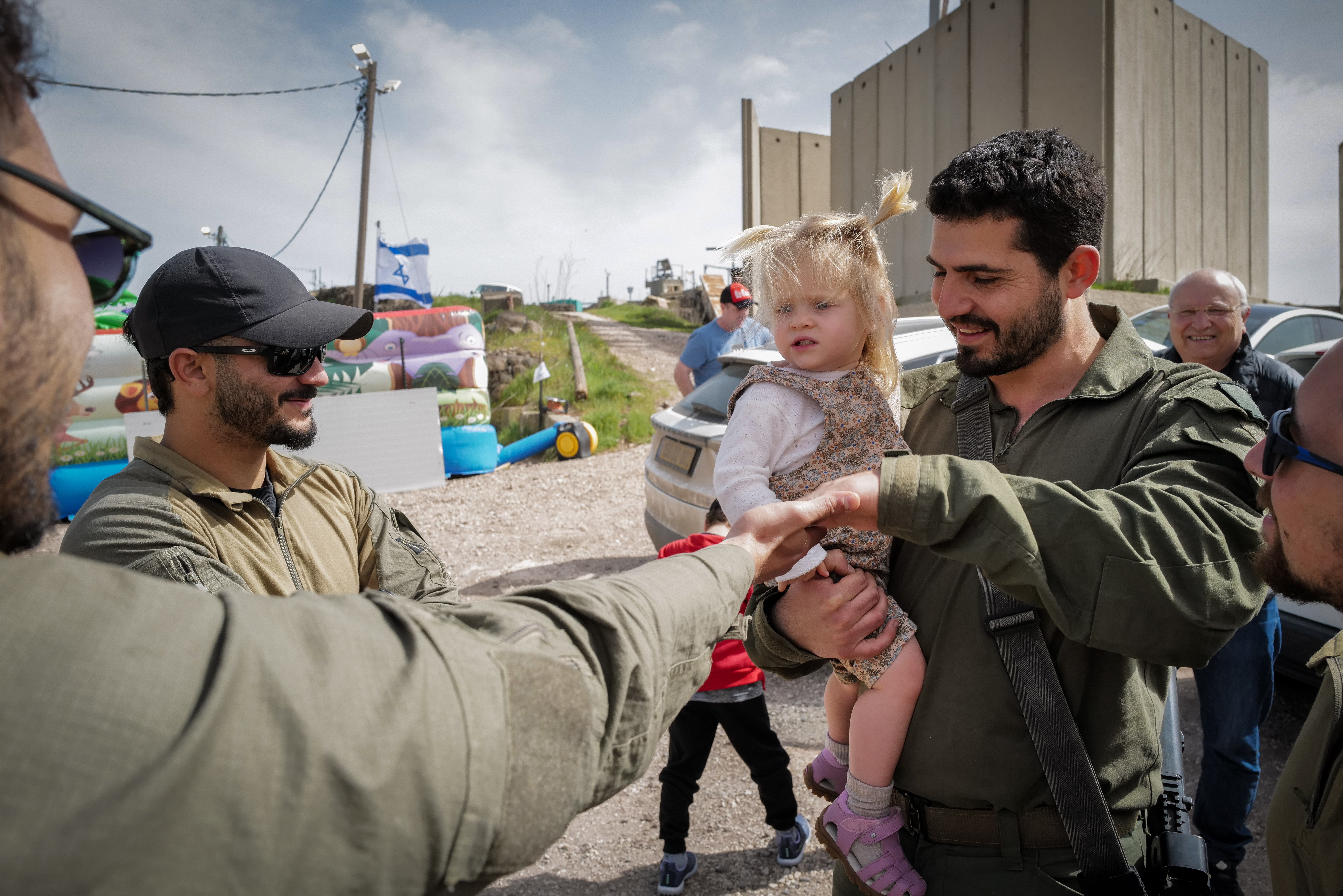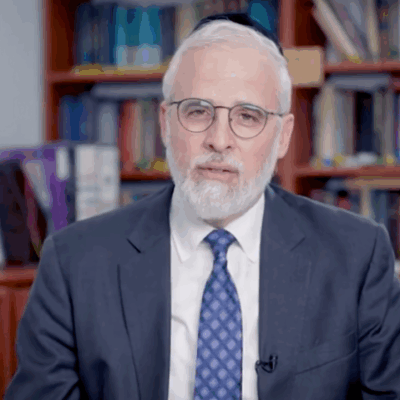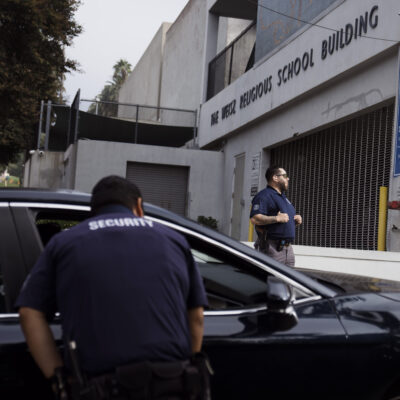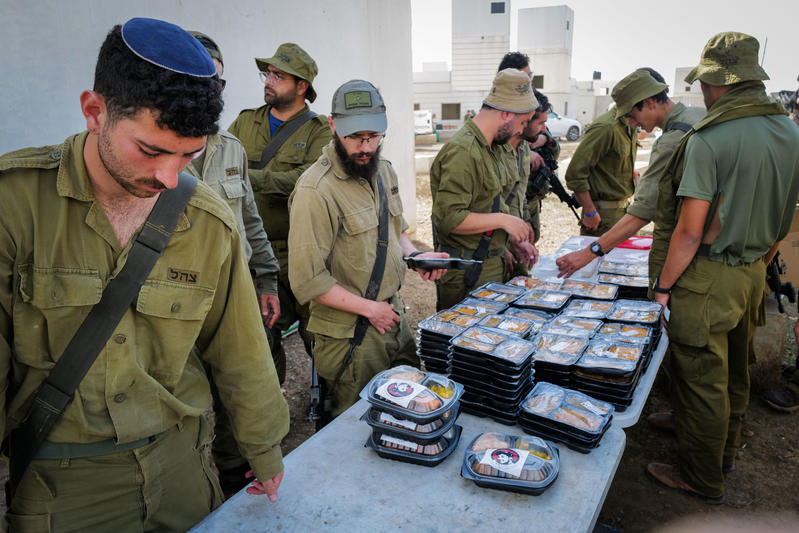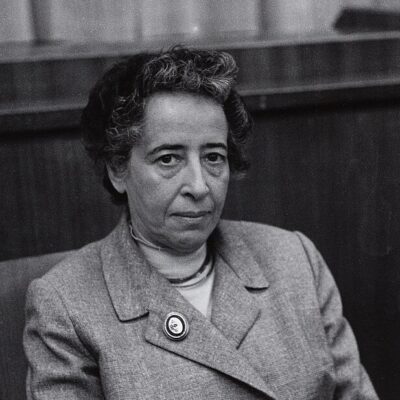SAFETY FIRST
Jewish self-protection initiative offers gateway into larger community, volunteers say
Members of the Community Security Service's ROAM program say a desire to provide security to synagogues in the wake of the Oct. 7 attacks has brought them closer to Judaism as well

Eric Thayer/Getty Images
Security guards stand watch in front of a synagogue in Los Angeles on Oct. 9, 2023.
After the Oct. 7 massacres, Ben knew he needed to do something. While other American Jews “Surged” into temples, attending services wasn’t an option for him.
“As a kid, my parents were both Reform rabbis,” Ben told eJewishPhilanthropy. “That’s a big part of the reason that I really moved away from it.”
But Ben always had an interest in security and had trained in multiple forms of martial arts. Growing up, he dreamed of joining the police. Less than three weeks after the Hamas attacks, he Googled “Jewish volunteer security” and came upon the website of the Community Security Service, a nonprofit that trains Jews to protect their own communities. “I applied immediately,” he said.
Ben is one of over 200 active members of CSS’s young professional team, ROAM, which stands for “respond, organize, act, maintain.” Most ROAM volunteers are unaffiliated Jews, and for many, the program acts as a gateway into the larger Jewish community, according to CSS. (Ben and other CSS volunteers interviewed for this article asked to be identified by their first names only for personal safety reasons.)
As antisemitism has skyrocketed in the United States, so has the cost of security for Jewish institutions, making volunteer initiatives more attractive. Local Jewish volunteers also have a better understanding of the community, giving them a better instinct for when something is amiss.
The model proved its value on Yom Kippur in England, during the Manchester terror attack, when volunteer security guards barricaded the door and prevented even more deaths as the bomb-carrying terrorist was kept outside.
Richard Priem, the CEO of Community Security Service, is now dedicated to the Jewish community, but, like Ben, he too was not religiously engaged. “I grew up in Amsterdam,” he told eJP. “I wasn’t religious or very active in the Jewish community at all.”
An experience protecting a local synagogue at 17 led to Priem taking on a leadership role in Netherland’s main Jewish security organization. Then came a move to Israel, where he served as an IDF paratrooper, followed by stints as a counterterrorism advisor for the United Nations Security Council and as director of international affairs at the Anti-Defamation League. In 2020, he joined the CSS as head of operations.
Jews protecting Jews is nothing new and is common in communities around the world, he said. In England, there is the Community Security Trust, which launched in 1986, but has roots in organizations born in the early 20th century. Argentina has a security organization, as does Netherlands, where Priem served.
“Historically, the Jewish community couldn’t always rely on their governments to protect them,” Priem said, noting wryly that it was a “special police officer who pulled my grandparents out of their home during World War II.”
CSS began in 2007 as a volunteer organization, but ballooned in the following years due to increasing attacks on the Jewish community. The 2018 Tree of Life synagogue shooting in Pittsburgh’s Squirrel Hill neighborhood led to a rush of philanthropy to the organization, allowing it to transition from a volunteer-run initiative to having a staff of full-time professionals, including Priem. Today, CSS has headquarters in New York, Washington, Los Angeles and Miami with volunteer-led chapters throughout the country.
“When it comes to security, nobody knows the community better than people from the community,” Priem said. “And nobody’s going to care more about the safety of the people inside the Jewish event or the synagogue than people whose own friends and family are members.”
These self-security models also face challenges in ensuring that Jews from more marginalized communities are not made to feel under scrutiny or unwanted. Priem acknowledged that some Jews of color have experienced profiling by untrained members of the community who were attempting to act as security, though he said there have been no reports of it occurring when a CSS-trained volunteer was on duty. He added that it would be taken seriously if it were reported. “Good security means people feel welcomed,” he said.
While the CSS website makes no reference to Jews of color or LBGTQ Jews, Priem said that the ROAM training includes a curriculum on unconscious bias and about Jews of color that was co-created with Tamara Fish, the co-founder of the Jewish diversity nonprofit Khazbar.
Originally launched at the beginning of the COVID-19 pandemic, the ROAM program has gone from protecting 20 synagogues to guarding over a hundred yearly. ROAM volunteers, aged between 20 and 35, train for three months and serve, on average, for three to five years. “That’s our goal,” Priem said. “Some of them move on to become leaders themselves, and really, our vision is a life cycle of Jewish service.”
Volunteers are exposed to different sects of Judaism and ways to connect to the faith and culture. It “becomes a pathway to the Jewish community,” Priem said. Last year, two volunteers even got married after meeting through the program.
Interest in ROAM erupted after June’s deadly firebombing at a “Run for Their Lives” event in Boulder, Colo., and today there are teams in Washington, Philadelphia and Los Angeles with plans to expand to ten cities over the next three years. There has never been an attack under their watch, yet their surveillance has deterred attacks and put would-be terrorists behind bars with the help of the police, Priem said.
Ben, a voice actor by day, was so determined to enroll in ROAM that he studied for days before the introductory interview. Not only did he research surveillance, “I had Menachem Begin quotes ready,” he said, referring to the former Israeli prime minister.
Soon, Ben was the captain of a New York-based squad, and since joining, he’s served hundreds of hours at over 50 events ranging from a small fundraiser for United Hatzalah to the Israel Day on Fifth parade. “It gives me that sense of purpose,” he said.
In colleges, CSS is also helping introduce young Jews to the larger community. Through its “Krav and Kesher” program, launched after the Oct ober 2023 “Cooper Union Siege,” students learn situational awareness, conflict deescalation and self-defense.
Like Ben, Sydney, a college student at Georgetown University, had a background in self-defense, having studied Taekwondo. She joined Krav and Kesher as a way for her to connect to Jewish culture through Krav Maga, the Israeli martial arts for, and today, she serves as her school’s campus fellow. The experience has introduced her to peers who aren’t as connected to Jewish life as she is.
“On campus, we talk about having safe spaces, but for a lot of Jewish students, there aren’t a lot of safe spaces,” she said. CSS’s training, she said, gives Jews the confidence to explore their heritage without fear. After graduating at the end of the school year, Sydney plans to join ROAM.
For Ben, it’s knowing people appreciate his service that makes it worth it. “You get this constant stream of upsetting news,” he said. “And you could go on social media and rage back. That doesn’t help anybody. But when you’re standing for a shift and making people feel safe and people are telling you, ‘Thank you for your service. Thank you for being here. I feel safe.’ Nothing is more gratifying than that. Nothing makes me feel like more than I am in the right place, the place I’m supposed to be.”
Since joining ROAM, his family has increasingly donated to Jewish causes while halting donations to causes that are no longer aligned with their values. They joined a synagogue, and Ben’s trying to bring CSS into the congregation. Prior to the Hamas attacks, he hadn’t been to synagogue for six years; now he attends most Friday nights. He was in synagogue during the High Holy Days and has volunteered as an usher.
“It even gave me the opportunity to even reconnect with my father,” he said, “and talk about the book of Maccabees and stuff that I never in a million years would have guessed I would be interested in.”

 Add EJP on Google
Add EJP on Google